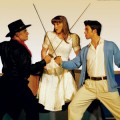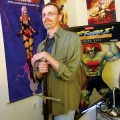Jane McGonigal’s, Reality Is Broken (Penguin Press; $26.95 hardback) is about the most dire of issues. It’s about a deep lack at the heart of society. It’s about work, empty consumerism, the struggle for happiness and the fate of the world. Which is to say, it’s about games.
Jane McGonigal, who reads Feb. 16 at Barnes & Noble Stevens Creek, is a game designer who favors an unusual platform: the real world. For the past three years, she’s been a part of Palo Alto’s Institute for the Future, researching the interaction between games and reality, when not working with other organizations, or on her own, on games to solve serious problems.
Computer games are perhaps the greatest escapist medium ever created, and McGonigal makes the case that they satisfy basic emotional needs that reality currently doesn’t. The biggest of these emotional needs are about work. Games are better than reality at making people feel productive, at giving people an opportunity to achieve, at creating a context where work is as intrinsically rewarding.
According to McGonigal, this ability of games is a reason to be optimistic. Games have the power to focus epic levels of effort, creativity and organization on solving problems, and because of this, they are lever with which to move the world.
Metro: How did you get started in game design?
McGonigal: I came out to do my Ph.D. in Berkeley, and I was intending to study theater. And when I got out here, my first semester there was a startup company looking to do a mobile game that would be played on the streets of San Francisco, and they needed someone to help stage manage the game and write it. It seemed like something a theater person would be good at—sort of live-action games and reality—so I got a job doing that my first semester here, and that changed the path that I was on.
How did that first game go?
It was great. The main thing that I learned from that game, what I first started writing about, was that playing a game in reality changes how you think about reality. If you play a game on a street block, you’re more likely, when you come back to that block, even if you’re not playing the game anymore, to do things that are gameful—like to help someone who needs help or to go into a space you’ve never been before. …Those lingering effects of having played a game, and tracking those, and figuring out why they happen, that was where my research started.
One of the things that struck me as interesting about the games you make is that it’s not just about creating this game structure, there’s also a large element of fantasy. Why do you think the fantasy mind-set is important when making a game that’s going to affect the real world?
I know there are a lot of people right now who are trying to look at some of the most abstract elements of games, like points and levels and achievement badges, and I think that really misses the point of what makes a game a game.
There’s this great quote in the game industry that “every game is a power fantasy.” And people mean different things by that, but what I think it means is that every game is about the fantasy that you have the power to change the world, or at least the power to save someone, the power to make a difference.
Games are really designed to give you that sense of agency, of heroic purpose, that you can really rise to the occasion. So when I make games about real world problems, like climate change, or oil dependency, or poverty, I want to play into that power fantasy and see if we can make it real.
In the book, you talk about Superbetter, the game you originally made to help yourself recover from a serious head injury. Now that you are working on a commercial version, are you finding it a challenge to get people to reach out for help from others, as the game requires?
We’re testing it with different kinds of personalities, I guess you would say. There are a couple of different reasons why people withdraw when they have injury or illness, and we’re working with different personality types to see ways that the game could support people overcoming that.
One of the things that we’ve found is really helpful is that the game helps you come up with specific things you can ask people to do. Something as simple as “Come see me once a week and make me laugh, that’s your mission.”
What we find in the big obstacle for people reaching out for support is they don’t know what to say to somebody. It feels overwhelming, it’s too vague and amorphous. Like you know, “I need help”—you don’t want to say that. And people who want to support you don’t know what they’re supposed to do. That’s something everybody experiences, where you see somebody who’s having a hard time, and you would help if you just knew what you could do.
The science says that if you have three people that you can ask for help, during any injury or illness, that you increase your chances for recovery by more than 100 percent, and it speeds up recovery as well. That’s one of the most important things about the game, just trying make sure everybody feels like they can get two, three people, even if it’s not the three people they might have thought of immediately.
In the book you talk about the potential of making work more gamelike. Have you seen any companies that have given that a serious try?
Zappos, I think, has one of the most interesting examples. Zappos has a game that you play whenever you log into your computer at the office, where it shows you a picture of somebody else at the company, and they ask you if you know who that person is and what they do in the company. And it keeps track of how many people you were able to recognize, and from what I’ve hard from Tony Hsieh, their CEO, that this has really transformed the social atmosphere, that people are more likely to stop and introduce themselves to somebody else they don’t know that they’re passing by in the hall.
And it’s become this kind of addictive game that people like to play when they check in. You can see your streaks, like how many days in a row did you get the right person, you can see who knows the most people. … It’s not like they’ve transformed the whole company to work like a game, but they’ve found a really meaningful game to play in the first one minute of everybody’s day at work.
Jane McGonigal Reads
Wednesday (Feb. 16), 7pm
Barnes & Noble Stevens Creek, San Jose

 Food & Wine Events: Feb. 16-23
Food & Wine Events: Feb. 16-23 


